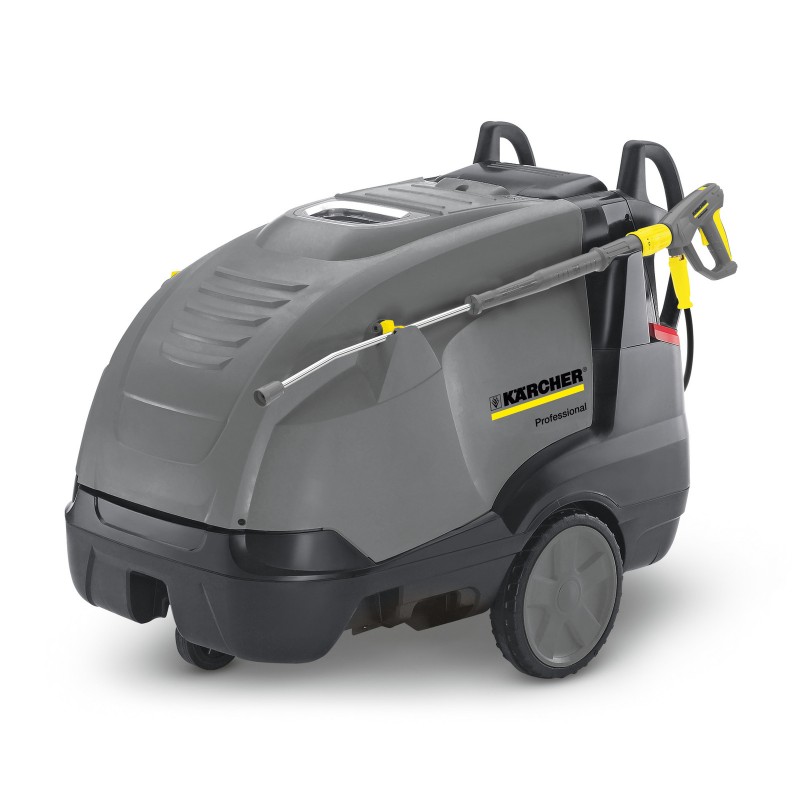
 reviews - see more
reviews - see moreNo products
Prices are tax included
How to choose a pressure washer
Pressure washer machines are used in an array of situations, from washing the family car once a week, and keeping the patio clean, to commercial uses. These can include jet washing cars in a commercial car wash to cleaning lorries and fleet vehicles for maintenance. The choice of machine you choose will depend on the situation and scale of use.
The smaller-scale machines, which are often available from your local DIY store, operate with cold water. They have a smaller electric motor that provides the pressure. They are ideal for the domestic setting, keeping the patio clean and washing the car. The main issue here is capacity. If you have a larger area of patio slabs to keep clean, then a medium-sized machine may suit. The capacity is measured in KwH, a smaller machine may be powered by 1000-2000 KwH, while other higher-powered washers will have a much higher KwH rating.
Noise is a factor to consider, and the machine will require power to operate. Smaller models tend to be quieter, but there is a trade-off between noise and power. If you require a more powerful machine, then ear protection is recommended.
Should you pick a hot water pressure washer?
If you are working on a commercial scale, running a car wash, cleaning patios for clients, or keeping a fleet of vehicles clean, then a pressure washer with a heater is going to be your best bet. This is jet washing at a different scale. The heat enabling the cleaning process to be speeded up, whilst also removing any grease and oil more efficiently.
Shop floors, garage forecourts and drive-thru’s will benefit from the heat of a hot water pressure washer, and it will clean concrete more thoroughly. If your surface would benefit from this, then the extra cleaning power a hot water washer gives is worth the investment.
See Our Range of V-TUF hot and cold pressure washers
However, a hot water pressure washer will cost more to purchase or hire. It will also require more frequent and costly maintenance, and the running costs are higher.
As with cold water pressure washers, most hot water machines run on electricity. This is ideal for fixed site operations with access to a power supply. However, for mobile use and sites where there isn’t accessible power, you will need to use a pressure washer with its own heater. Petrol- or diesel-powered engines are typically used for this purpose. Be aware, when you choose your option, that petrol requires a spark to ignite, and if you are operating in an environment where naked flames are not permitted, such as a petrol forecourt, the diesel option may be essential.
A hot water machine will need a special pressure hose which can handle hot water at pressure. The hose will also have a finite life and will need to be replaced at regular intervals. If you are using your jet washer to cover a larger area, then you may need several lengths of hose. Each is connected to the next with a special fitting, and care is needed to ensure that the connection is properly secure before you start using the machine. There are few things more frustrating than, having spent time setting up, switching on the machine and finding that a connector has disconnected. You then need to switch off the machine, re-connect the two lengths, which may be some distance away, before re-starting.
When it comes to sourcing your machine, you can choose to purchase, lease or hire. For a domestic situation, there is a wide range of models available at your local DIY store. For the larger scale machine, specialist suppliers are available to advise on the model that best suits your need.
Karcher are a brand leader for supplying pressure washers. However, there are is a number of other suppliers available, including Nilfisk, V-Tuf, Ehrle, Kranzle, Honda, Hyundai, Civic and JCB.
Some questions that need to be considered
If your machine is to be stationary or kept on a premises, then transport and storage are less of a challenge. However, if you are providing a portable service, then the practical arrangements of moving the machine will need to be considered. Will this need one person or several? Will this work with your operation?
Are you mechanically minded? If not, a machine which does not require much maintenance or which comes with support may be preferable. Otherwise, you will need to ensure you have access to a maintenance service.
Ultimately, identify what you need your machine for. If it is a small machine for domestic use, there is an abundance of models at your local DIY store. For the more demanding brief, some further research will be needed.
Please also see our guides on
For more informations call us on : 01406 426513
or write to: paul.seaman@hortechsystems.co.uk
